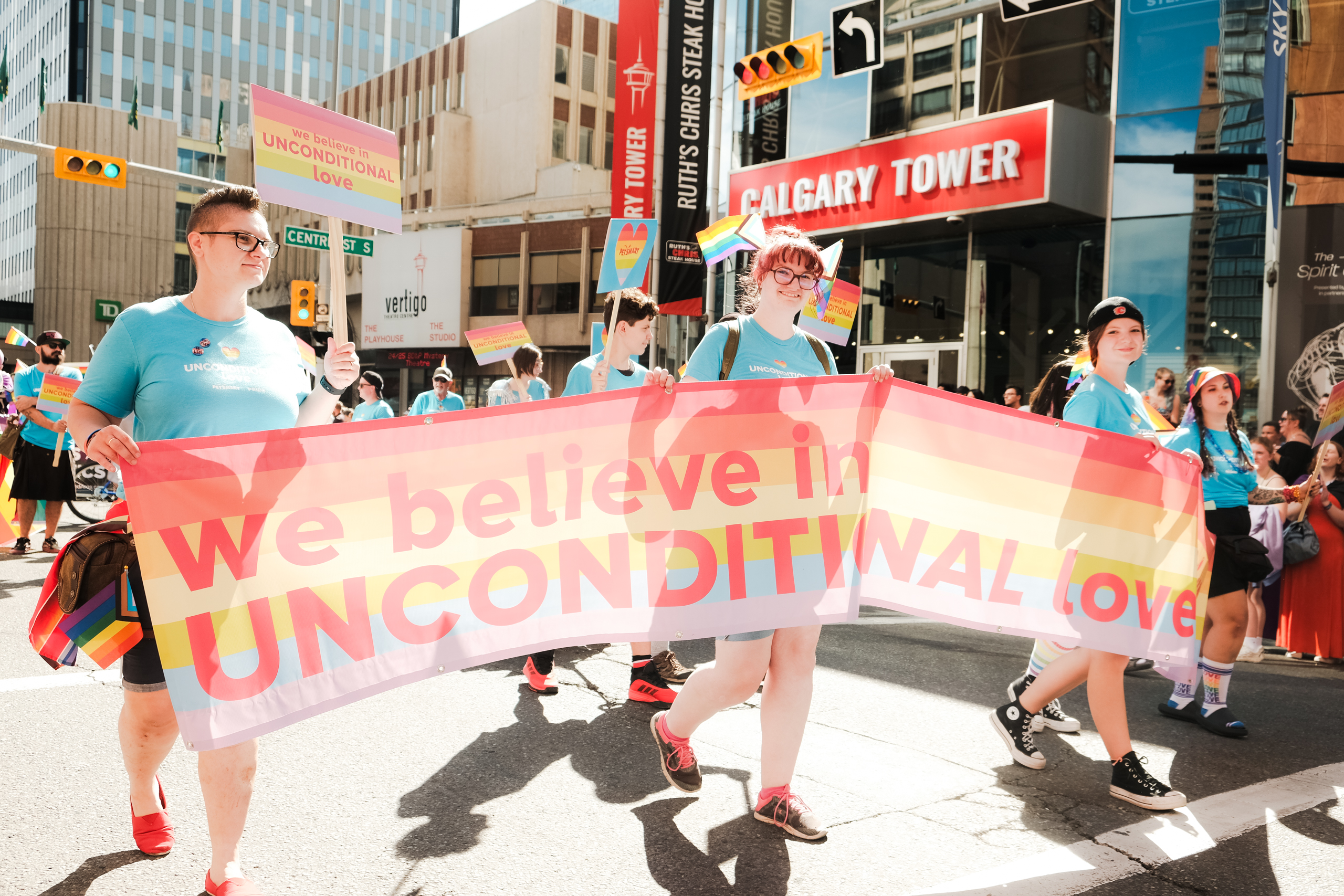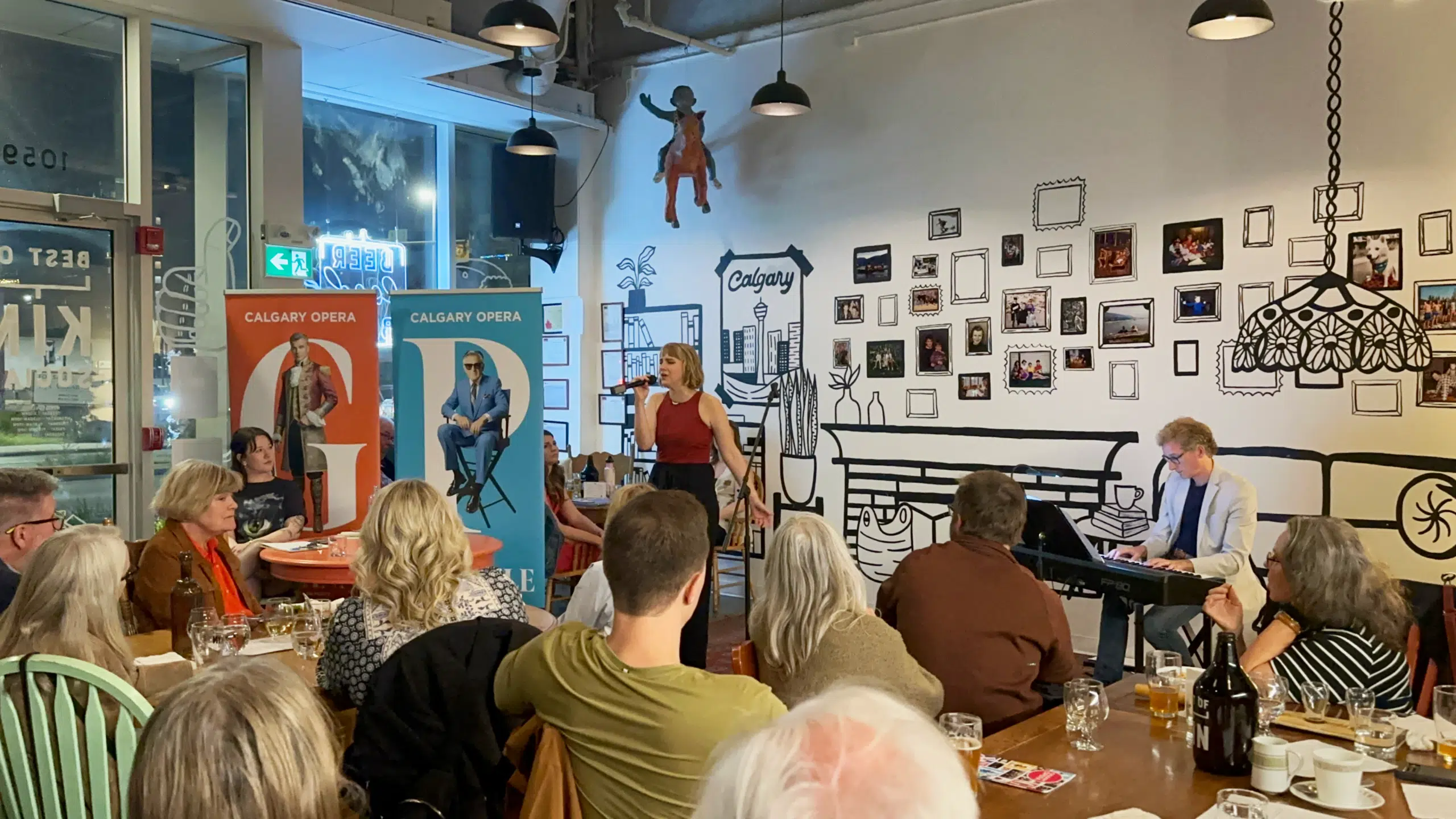With rising prices on housing and goods, and tariffs making even the price of orange juice shoot through the roof, for many of us, going on trips away for the summer just doesn’t seem like the thing to do.
“My anticipation is that there’ll be more people having a staycation in Calgary and [they] will be looking for something to do,” said Michele Gallant, executive director and producer of the Calgary Fringe Theatre Festival.
Summers are so often marked by trips down south for a frolic through Disneyland to a crazy weekend away in a Vegas casino. But between high costs and the worry about getting stuck at the US border, over 50 per cent of Canadians have cancelled or changed their US travel plans this year, according to a survey by Abacus Data.
But festivals like Gallant’s Fringe are here to fill the void of what to do, without breaking the bank.
“With the Canadian Fringe model, 100 per cent of the box office price … goes directly back to the artist,” said Gallant. “And because it’s their box office, [they] have a choice to offer pay-what-you-want pricing.”
Along with affordable and accessible pricing, Fringe is doing what it can to make Calgarians feel like they’re going on a summer vacation — without going broke.
The festival is indulging in the “staycation” vibe with its Camp Fringe theme. Volunteers will dress up as rangers, offering walking tours of the Inglewood festival grounds, showing off the different venues to attendees along with tales of the festival’s past. While Calgary’s festivals are taking advantage of people choosing to stay at home this summer, that doesn’t mean that the US and Canada’s strained relationship isn’t taking a toll.
“For some US artists right now, there’s some anxiety about going across the borders,” said Gallant.
Gallant’s assured the three American acts set to perform at this year’s Fringe that she will hold their spots for them until next year if they aren’t confident they’ll be able to get back home if they cross the border for the festival. Fortunately, at this point, all three acts seem to be going ahead as planned.
Not every festival has been so lucky.
“We have had a few of our emerging performers who were coming in from the States have to cancel because they weren’t sure about the climate, in terms of them re-entering the States,” said Hemen Tor-Agbidye, Sled Island Music and Arts Festival manager. “It was just a risk they didn’t want to take.”
Sled Island is no stranger to the funding challenges of booking international acts — artist fees (and the exchange rates), hotels, flights — it all adds up. But not being able to keep them on the roster is a new one.
Luckily, the Sled Island 2025 lineup features plenty of American acts that have stayed on board and a healthy helping of international acts. In part thanks to selections from guest curator Otoboke Beaver, a Japanese four-piece punk rock band, the festival features acts from Japan and Taiwan like DMBQ and BB Bomb.
Sled Island does itself some favours by avoiding challenges that other festivals face. Beginning the festival planning process puts them well ahead of schedule, allowing them to see and face challenges before they become a problem.
“Overall, in Calgary, I find we’re losing music venues,” said Tor-Agbidye. “We’re fortunate that our festival runs with some of the more long-standing venues, so we’re not too affected.”
Calgary International Bluesfest didn’t have the opportunity to think too far ahead before they were hit with the news earlier this year that their venue for the past 14 years, Cowboys Park (formerly Shaw Millennium Park), would be undergoing extensive renovations that would make it no longer a good location for the festival.
“It’s just giant patches of pavement,” said Cindy McLeod, Bluesfest founder and producer. “It’s not really suitable anymore for a family music event where people sit on the grass and listen [to music] all day.”
While the renovations to Cowboys Park include utilities upgrades that will make future events like the Cowboys Music Festival in July run more smoothly, they don’t match the vibe of Bluesfest. Fortunately, McLeod looked elsewhere and found the new home for Bluesfest at The Confluence Historic Park.
Overall, McLeod estimates that production costs from the festival are up 35 per cent. She primarily works alone at the festival, so downsizing staff isn’t an option. But she remains dedicated to keeping the first three days of Bluesfest completely free to attend.
“It’s really important to me personally that nobody is excluded from experiencing and enjoying the blues,” said McLeod. “If money is a barrier, they don’t have to worry.”
The only way Bluesfest could make its operation any leaner would be by pulling back on the free events. Unfortunately, that’s exactly the decision that Jazz YYC had to make for their festival this year.
For the past couple of years, TD Bank, a major sponsor of festivals across the country, has been pulling out of sponsorship deals. In 2025, Jazz YYC found itself in that position.
“Where we’ve had to step back is generally one of the big events we do in our festival,” said Kodi Hutchinson. “It’s a free outdoor stage show on the final day.”
It’s a blow to Jazz YYC to pull back on the outdoor stage show, but Hutchinson said that once the organization secures more sponsors, the free stage show should return for the following year.
It was a decision about whether or not to take the risk of doing the stage show and hoping that ticket sales would be enough to cover the cost, potentially operating at a hefty loss this year. Rather than take that risk, Jazz YYC opted to add smaller-scale events to the lineup, including workshops and a kids’ showcase on the final day of the festival.
“As everyone loves to say in the arts world, we pivoted,” said Hutchinson.
It’s what these festivals are fantastic at. None of these festivals would have survived COVID if they had not taken the challenges in stride and tried to adapt to the changing landscape. No other festival demonstrates the willingness to pivot quite like Calgary ReggaeFest.
After a few years of struggling post-COVID and dealing with volunteer fatigue, ReggaeFest scaled back in 2024 to a single day at Sunnyside’s ContainR Art Park, calling the event the “Sunny Soul Jam.” It was supposed to be the perfect way to reinvigorate ReggaeFest.
“It was beautiful,” said Leo Cripps, ReggaeFest producer. “The band played and did a full set, and as soon as they got off, it was lightning, thunder, rain.”
The torrential downpour washed out the rest of the festival, and the remaining acts never got the chance to perform. When it came time to plan the festival for the following year, Cripps and his team had to figure out not just how but if they were going to do it.
“If we’re going to come back and do it, let’s do it like we would do a regular festival,” Cripps said.
The two-day festival is back again this year, this time taking on the outdoor stage on St. Patrick’s Island. Cancelled acts from the previous year were invited back, along with some exciting new ones.
“Everything has been going so smoothly,” said Cripps. “I’m scared that something is going to drop that’s going to throw a wrench in it.”
It’s a tune that echoes across Calgary’s festivals. While there are certainly struggles, for the most part, operations are going to plan. Even for some of Calgary’s smaller, less established festivals.
The Eastern Slopes Music and Arts Festival is entering its second year and already expanding. While the first year was fully music-focused, Eastern Slopes is launching an arts market for locally made goods for its sophomore edition.
“It’s been a lot smoother this year because we know what to expect,” said Hannah Unterschultz, executive director of Eastern Slopes. “We’ve had one under our belts. We know people will come. We know people are interested.”
With a lineup of artists spanning genres from R&B to country, pop, to rock, Eastern Slopes is set up for another year of music that appeals to everyone. The festival also plans to introduce flexible ticket pricing offerings closer to the August festival date.
Meanwhile, Sound Atlas is in its third year of bringing contemporary classical music to Calgary. This year’s theme, Sonic Playground, hopes to bring a playful and interactive element to the festival. The festival is introducing new multimedia elements, but that comes with an additional cost.
“We have a little more stability in knowing our audience and our financial stance,” said Jani Parsons, co-director of Sound Atlas and a founding member of the host ensemble, Latitude 49. “We’ve been able to be a little bit more adventurous with the stuff that we program.”
A big focus for Parsons this year has been ensuring the festival’s longevity. Part of that is working towards making Sound Atlas a charitable organization to help secure funding. This is an approach that Sled Island has also taken.
“Sound Atlas is like an organism,” said Parsons. “We want to keep it alive. We want it to thrive here in Calgary.”
Taking care of our festivals is how we keep them alive, even in those years when the dollar doesn’t go as far. After all, a festival pass is (usually) cheaper than a plane ticket.



